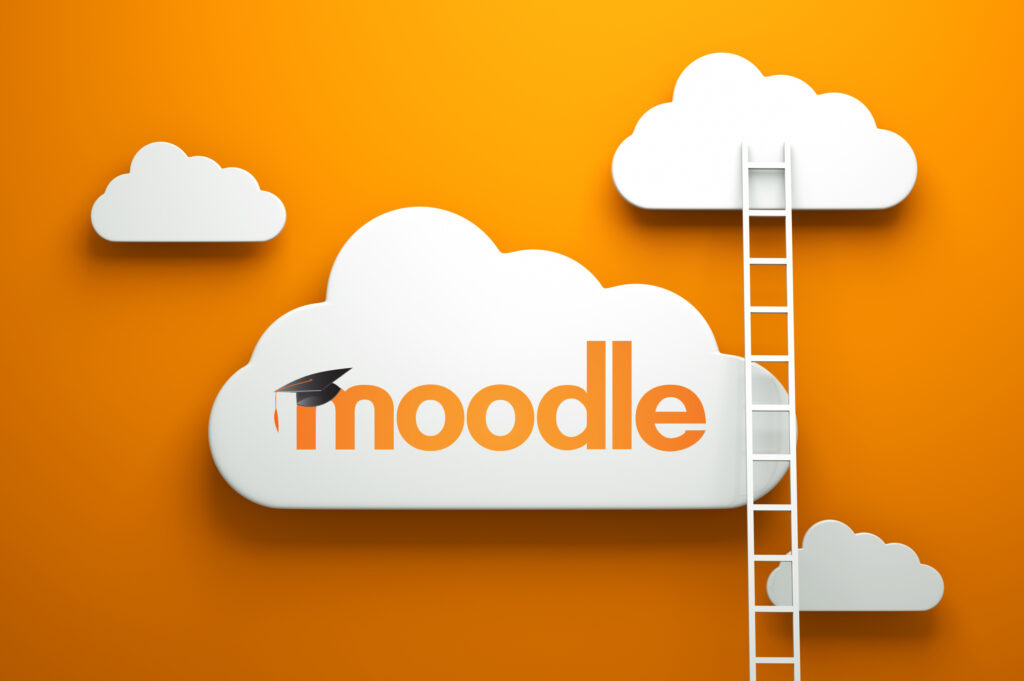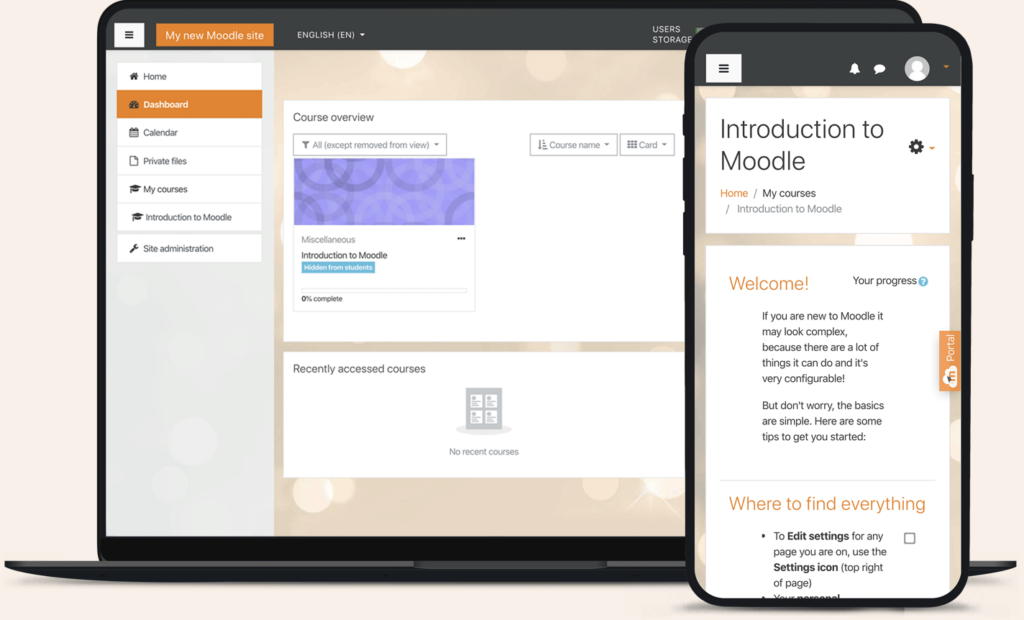Moodle, the popular open-source learning management system (LMS), has become a go-to choice for organizations seeking to meet their education and training requirements.
However, with multiple hosting options available, it’s essential to understand the pricing details and features to make an informed decision. In this blog post, we’ll explore the various Moodle hosting options and delve into the factors to consider when choosing the right plan for your e-learning journey.
Moodle Hosting Options and Pricing
MoodleCloud
MoodleCloud is an official cloud-based hosting solution offered by Moodle itself. It provides a hassle-free experience, starting at an affordable price of $120 per year. With MoodleCloud, you can access all of Moodle’s key features and choose from five different hosting plans, including Starter, Mini, Small, Medium, and Large, each with varying prices and features. These plans cater to different user limits and file storage allowances, allowing you to scale your e-learning platform as your organization grows[3]. Additionally, MoodleCloud plans come with integrated video conferencing capabilities, accommodating up to 100 users.
Self-Hosting
For organizations seeking complete control and customization, self-hosting is a viable option. Self-hosting requires purchasing a server, which may cost up to $50 per month for a reliable and scalable solution.
While it offers greater flexibility in terms of customization, it also demands technical expertise in Moodle and DevOps to handle server management, security patches, and backups. Although self-hosting can be more cost-effective, it entails additional responsibilities and may not be ideal for those lacking technical resources.
Other Hosting Providers
In addition to MoodleCloud and self-hosting, various hosting providers offer Moodle hosting solutions.
Providers like Moonami, A2 Hosting, and e-padi.com offer a range of hosting plans with different features and pricing options.
While these providers may offer competitive rates and tailored services, it’s essential to research and compare their offerings to ensure they align with your organization’s specific needs.
Features Included in Each Moodle Hosting Plan
MoodleCloud’s hosting plans share a set of standard features across all tiers[1]:
- Hassle-free and easy to use: Getting started with MoodleCloud is a breeze, enabling you to focus on creating engaging e-learning content.
- Create a personalized site name: Establish a unique online presence by customizing your site name to reflect your organization’s branding.
- Set up unlimited courses and activities: Enjoy the freedom to create and manage an unlimited number of courses and activities tailored to your learners’ needs.
- Track site usage and monitor growth: Gain valuable insights into user behavior and track the growth of your e-learning platform with robust site usage analytics.
- Integrated video conferencing up to 100 users: Enhance your online learning experience by seamlessly conducting video conferencing sessions for up to 100 users.
For a detailed breakdown of user limits, file storage quotas, and prices for each plan, visit the MoodleCloud website and explore the “Choose your tier” tab. Clicking on the first box will unveil the different plans and their respective quota limits and prices.
Differences Between Fully Hosted and Self-Hosted Moodle Plans
When choosing between fully hosted and self-hosted Moodle plans, several crucial distinctions must be considered:
Fully Hosted Moodle Plans
Fully hosted Moodle plans are cloud-based solutions managed by third-party hosting providers. These plans are typically more expensive than self-hosted alternatives but offer numerous benefits, such as:
- Low Maintenance: Hosting providers handle server infrastructure, maintenance, backups, and upgrades, freeing organizations from the technical burden.
- Scalability: Fully hosted plans can easily scale up or down based on an organization’s needs, making them ideal for businesses with fluctuating requirements.
- Security: Hosting providers usually implement robust security measures to safeguard against cyber threats.
- Support: Providers offer support services, assisting organizations with troubleshooting and ensuring seamless LMS operation.
Self-Hosted Moodle Plans
Self-hosted Moodle plans require organizations to manage their own server infrastructure. While they offer greater customization and control, they also come with some drawbacks, including:
- Maintenance: Self-hosted plans demand technical expertise to manage server infrastructure, which can be time-consuming and require additional resources.
- Scalability: Self-hosted plans may be less scalable than fully hosted alternatives, making them less suitable for organizations experiencing significant growth.
- Security: Organizations must manage their security measures, which can be challenging without dedicated security staff.
- Support: Self-hosted plans require organizations to troubleshoot issues independently or seek external support services.
Moodle Pricing Compared to Other Learning Management Systems
Moodle’s pricing can be compared to that of other popular learning management systems to assess its value proposition:
Canvas
Canvas, a cloud-based LMS, offers various features and customization options. While Moodle is a better choice for organizations seeking more control and advanced customizations, Canvas may be an attractive option for those willing to invest in premium features. However, Canvas pricing is not publicly available, making a direct comparison with Moodle challenging.
Blackboard
Blackboard, a proprietary LMS, boasts numerous features and customization possibilities. Moodle is often favored for its open-source nature and customizability, while Blackboard may be considered costly and slightly outdated. Blackboard’s pricing is only available as a custom quote, while Moodle offers transparent pricing through MoodleCloud.
Google Classroom
Google Classroom, targeted primarily at schools, is a free LMS. Moodle, on the other hand, offers vast features and customization options, making it a preferred choice for organizations requiring comprehensive e-learning solutions. While Google Classroom is free for educational institutions, some companies may need to pay for access. In contrast, Moodle is free open-source software with potential additional expenses for customization and integration.
Schoology
Schoology, a cloud-based LMS, provides diverse features and customization capabilities. While Moodle has a larger user base and more reviews, Schoology boasts a slightly higher average rating.
In terms of pricing, Moodle offers both open-source and cloud-based solutions. The MoodleCloud hosting plans come with various features, and their pricing starts at $120.0 per year.
The plans include Starter ($120.00 per year), Mini ($210.00 per year), Small ($380.00 per year), Medium ($890.00 per year), and Large ($1710.00 per year). Each plan caters to a different number of users and file storage allowances, providing flexibility and scalability.
Factors to Consider When Choosing Moodle’s Pricing Plans
When deciding on the ideal Moodle pricing plan, several essential factors should be taken into account:
> Cost
MoodleCloud’s pricing plans offer different features and quota limits at varying price points. Analyzing your organization’s budget and the number of users you plan to accommodate will help determine the most cost-effective plan.
> Features
Different MoodleCloud plans offer a variety of features to cater to diverse e-learning needs. Identifying which features are crucial for your organization’s training objectives will aid in choosing the most suitable plan.
> Scalability
Consider your organization’s projected growth and assess whether the chosen plan can accommodate increased user numbers and additional file storage requirements.
> Customization
If your organization requires extensive customization of the Moodle platform, self-hosting might be a more viable option, allowing for complete control over the LMS environment.
> Support
Determine your organization’s support needs, as fully hosted plans generally come with comprehensive support services, while self-hosted plans may necessitate additional resources for troubleshooting and maintenance.
Related: How To Choose The Right Moodle Hosting Provider
Conclusion
Choosing the right Moodle hosting plan is essential for meeting your organization’s e-learning needs effectively.
With a wide range of hosting options available, each catering to specific requirements and budgets, careful consideration of features, scalability, customization, and support will aid in making an informed decision.
Whether you opt for MoodleCloud’s convenient cloud-based solutions or the flexibility of self-hosting, Moodle’s pricing options are sure to accommodate diverse organizations seeking to deliver exceptional online learning experiences.
So, get ready to embark on your e-learning journey with Moodle, knowing you have chosen the most suitable pricing plan for your needs.






